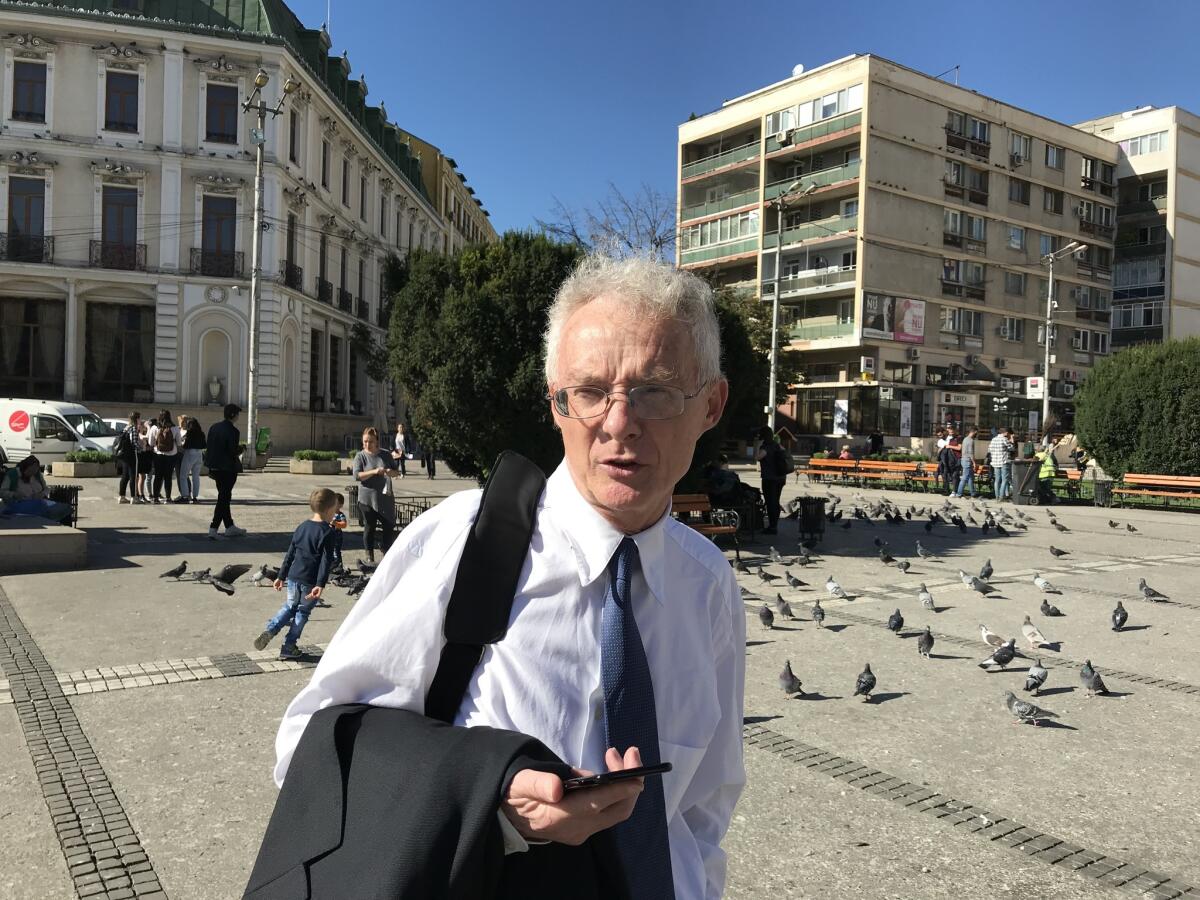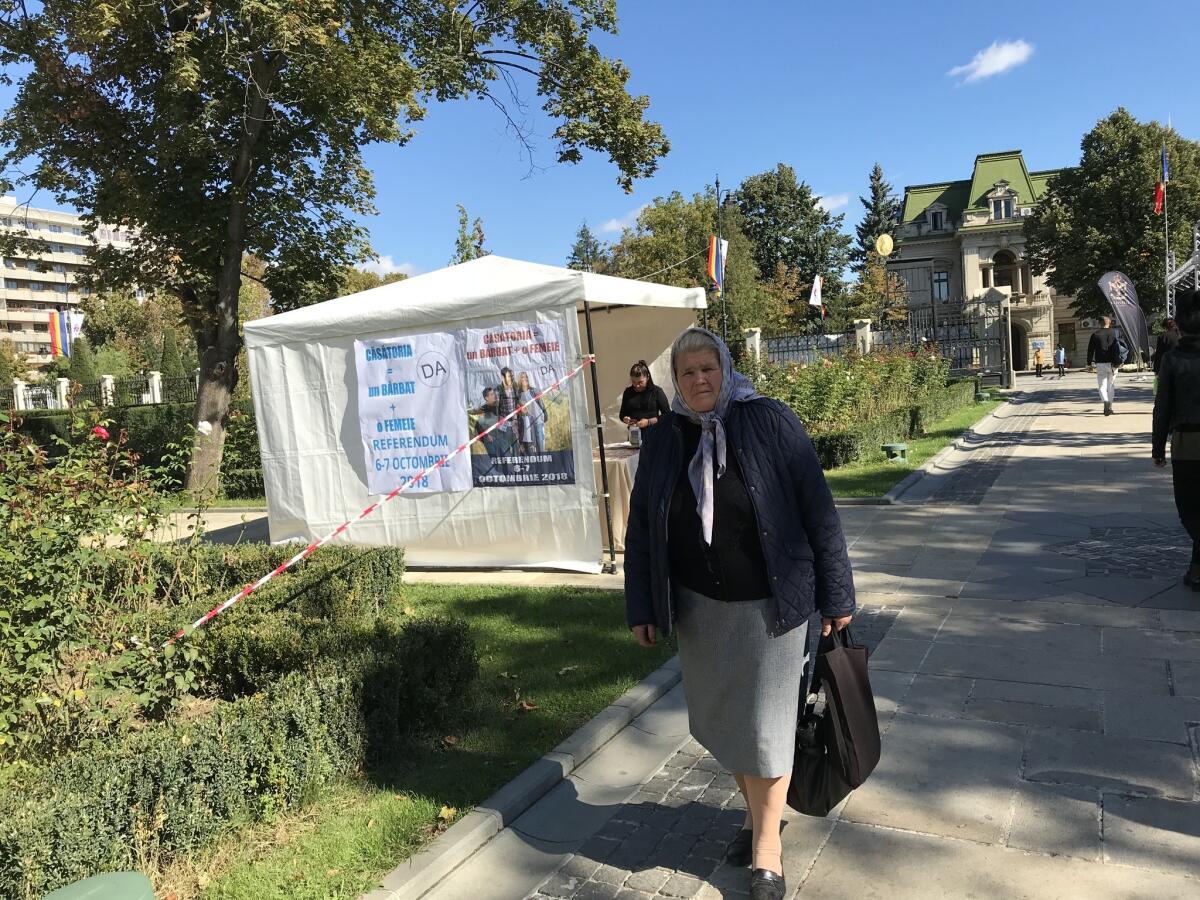The religious right lost the fight over gay marriage in the U.S., but it sees hope in Eastern Europe

- Share via
Reporting from Iasi, Romania — A few days before Romanians were to decide whether to change the constitution to ban same-sex marriage, Texas-based lawyer Peter Costea was busy crisscrossing the country, looking for votes.
In this northeastern Romanian city, he made the rounds, meeting the mayor and religious leaders in the Romanian Orthodox and Catholic churches. A 61-year-old Romanian American, Costea chatted easily in Romanian with medical students as he handed out literature about Saturday’s ballot initiative.
It wasn’t the first time Costea had campaigned against gay marriage here. Thirteen years ago, he worked with local Christian groups in the first push for a constitutional amendment declaring that marriage is a union between a man and a woman. That effort failed.
This time, he’s backed by far more firepower. Costea turned to the Alliance Defending Freedom, an Arizona-based association that has emerged as an influential legal force for the American religious right — part of a larger pattern of conservative evangelical and other Christian groups finding fertile new ground for pressing an agenda against marriage between same-sex partners.
“U.S. religious-right groups see the culture war as a global struggle, and they are increasing their impact around the world,” said Peter Montgomery, senior fellow at the Washington-based liberal advocacy group People for the American Way. Eastern Europe, he said, is a particularly attractive target, because of a backlash against the socially progressive policies of the European Union.
As greater rights for gay people have taken hold elsewhere — including the United States, where the Supreme Court legalized same-sex marriage nationwide in 2015, and India, where a gay-sex ban was struck down last month — conservative groups in Romania are hoping to stem the tide.
“It’s a way of protecting our children in front of this whole concept of gender ideology,” said Mihai Gheorghiu of the Coalition for Families, the consortium of religious nonprofit groups in Romania leading the charge on the referendum.
That meshes perfectly with the goals of Christian conservatives in the U.S.
“We are supporting our brothers and sisters, who are standing up to protect marriage and family,” said Brian Brown of the International Organization for the Family, a U.S.-based group that opposes same-sex marriage.
In Romania, the 2006 campaign failed because it did not meet the required threshold for signatures. But nine years later, the effort was revived — thanks in large part to the lobbying efforts of some of America’s largest conservative Christian groups, including Liberty Counsel and the European branch of Pat Robertson’s American Center for Law and Justice.
Human rights groups and the Southern Poverty Law Center say the legal arms of these groups, once criticized for their involvement in promoting anti-gay legislation in Africa and South America, have been emboldened by Donald Trump’s presidency.
Within days of Trump’s election victory, the Coalition for Families was “contacted by higher-ups in the Romanian government to say that things had changed in Romania because things had changed in the White House,” Costea said. They promised to help jump-start the referendum campaign, he said.
To that end, the Alliance Defending Freedom has held conferences and run an informational campaign backing the Coalition of Families to promote the Romanian measure. Along with Liberty Counsel, it also submitted friend-of-the-court memos to Romania’s Constitutional Court.
The saga playing out in Romania is part of a wider regional pattern. Croatia and Slovenia have passed similar measures defining marriage as being between a man and a woman, and initiatives elsewhere have sought to champion traditional definitions of family.
As conservative-populist movements have gained political ground across Europe, the U.S. religious right is finding common cause with Russian President Vladimir Putin, who has formed a close bond with the Russian Orthodox Church to burnish an image of Russia as a stronghold of Christian values.
In some ways, Romania’s constitutional change would be symbolic, because same-sex marriage is not recognized there. But proponents of the measure say it would affirm the country’s traditional values.
The European Court of Justice has ruled that all European Union countries — of which Romania is one — must recognize the legal rights of same-sex marriages granted in other countries within the bloc. EU member countries are allowed to define marriage as they choose, however, and none of the former Warsaw Pact countries in the bloc have legalized same-sex marriage.
Last month, Romania’s Constitutional Court did rule that gay couples should have the same “family rights” as heterosexuals in matters such as inheritance and medical issues.
A key umbrella organization for the fight against same-sex marriage has been the World Congress of Families, an Illinois-based, conservative Christian alliance jointly founded by Russian and Western religious groups that bills itself as “uniting leaders worldwide in defense of faith, family and freedom.”
“You have the American right that is spreading their wings with all these connections they have with Russia or with other conservative groups,” said Vlad Viski of Mozaiq, a Romanian nonprofit supporting the LGBTQ community.
Another Romanian gay rights advocate, Florin Buhuceanu, wrote in a 2016 report for the European Center for Public Initiatives: “With heavy support offered by their American counterparts, the religious right’s ambition in eastern Europe is to encourage, prepare and initiate a de-secularization process, dismantling piece-by-piece the most important elements of liberal citizenship.”
Lawyers from Liberty Counsel, the U.S. group that defended Kentucky court clerk Kim Davis when she refused to issue marriage licenses to gay couples, have been in Romania to work with Christian groups and conservative lawmakers to lobby for the constitutional change.
Gheorghiu, of the Coalition for Families, said the group invited Davis and international religious rights groups to Romania not for financial help, but to lend political guidance and expertise.
Liberty Counsel’s vice president of legal affairs and chief litigation counsel, Horatio Mihet, is a Romanian American who traveled to Romania with Davis last spring.
Mihet defended Davis in her 2015 case, and Mihet and Davis traveled across Romania to give talks and lectures over the course of 10 days, he said in a telephone interview. The pair came at the invitation of the Coalition for Families.
Mihet hotly denied human rights groups’ accusations that Liberty Counsel and other U.S. groups are exporting harmful prejudices, and he called a hate-group designation by the Southern Poverty Law Center “an unfortunate label” used to shut down debate.

The Coalition for Families, formed in 2014, used its expansive church-based network two years later to gather more than 3 million signatures — far exceeding the required 500,000 — to initiate the constitutional referendum.
Romania decriminalized homosexuality in 2001, and gay rights advocates said the country has slowly become more open. The annual gay pride parade has gone from 500 participants in 2000 to almost 10,000 this year.
Opponents of this weekend’s referendum are urging a boycott of the vote — a move meant to dampen the initiative’s chances of garnering the needed 30% turnout and at least 5 million votes in favor. Balloting will last for two days starting Saturday.
Many said they believed the referendum effort would never have advanced this far had it not been for the efforts of the U.S. conservative groups.
“The Orthodox Church would not have had the organization or power to transform this idea into action,” said Vlad Alexandrescu, a Romanian senator from a small opposition party that has come out against the referendum. He cited “American influence” as a crucial factor.
But Brown, of the International Organization for the Family, insisted that the American groups are only playing a supporting role, not orchestrating the campaign. “We are open, we are honest, and we are clear that we are helping. But in no way are we leading this effort,” he said.
Cultural and social factors help make Romania particularly receptive to the conservative aims underpinning the referendum drive.
Its population of 22 million is considered one of the most religious and conservative in Europe. The Orthodox Church plays a dominant role in Romanian social life, particularly in rural areas.
It’s also one of the poorest countries in the European Union, suffering from an exodus of young Romanians who leave the country for work elsewhere within the bloc. Concern has grown about an increasing number of children growing up without fathers or mothers, as unemployed parents look outside the country for jobs.
Corruption has sparked mass protests in Romania in the last year, and some said they saw politicians’ push to hold the referendum as a distraction from the real issues in the country. The referendum will cost a reported $46 million to put on.
“I think there are a lot of other things the government could use that money for — things we actually need, like schools and hospitals,” said Loriya Ionescu, 54, a teacher in Bucharest. “I think this is a waste of time and money.”
Referendum supporters have played up fears that same-sex marriage could contribute to an already declining population or pave the way for other liberalizing measures.
Costea insisted the referendum is not motivated by homophobia or judging people’s lifestyles. instead, he said, it is about Romanians creating a civic movement, a step entirely appropriate for a young democracy.
“Who would have thought 30 years ago that something like gay marriage would have caught on?” Costea said. “We are trying to solidify our belief before it spreads more.”
Special correspondent Ayres reported from Iasi, Romania, and Times staff writer King from Washington.
Twitter: @sabraayres
Twitter: @laurakingLAT
More to Read
Sign up for Essential California
The most important California stories and recommendations in your inbox every morning.
You may occasionally receive promotional content from the Los Angeles Times.













